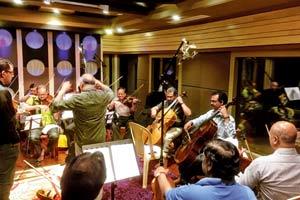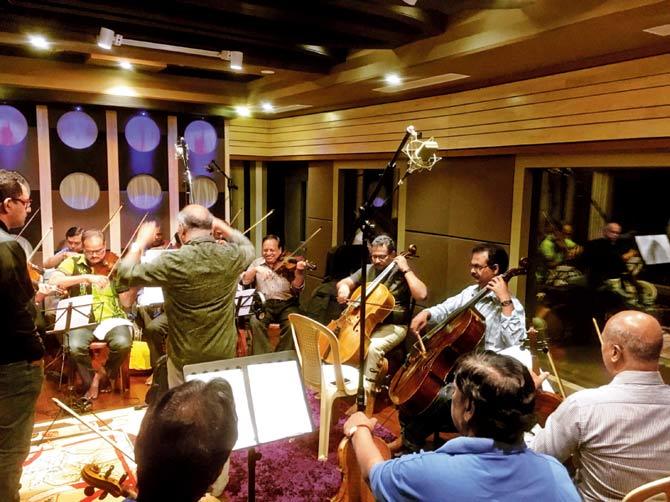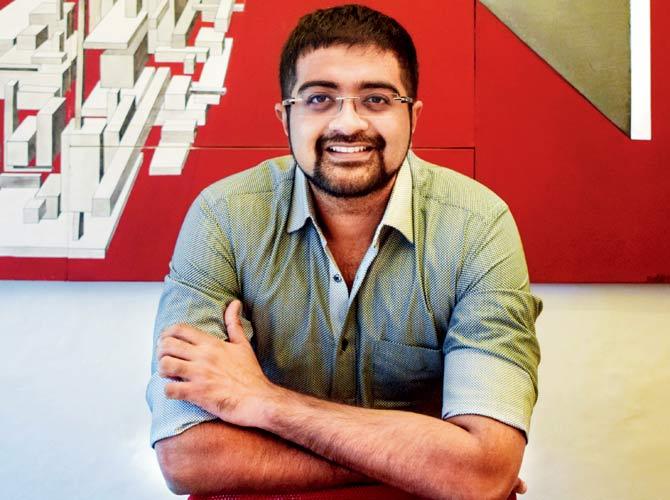Mannan Shaah, a young Bollywood composer, is keeping the art of symphony orchestra alive through his compositions


Legendary band Chennai Strings Orchestra, which has performed with AR Rahman, record a song with Mannan Shaah
Music director Mannan Shaah is somewhat of an anachronism in today's day and age. He doesn't like digitally composing his songs. He would rather fly down to Chennai from Mumbai, or even London for that matter, collaborate with 30 musicians over a song, irrespective of the time it takes, and return feeling creatively high. "I have always been fascinated by symphony orchestras and it was my dream to record one," says the 30-year-old, who began his career as a singer in 2011 with Vipul Shaah's Kucch Luv Jaisaa. His desire to record with a symphony orchestra was fulfilled five years later when he turned composer for Commando 2. The song Tere Dil Mein, sung by Armaan Malik, was a product of a 16-piece symphony orchestra.

No one-man army
It's been a year since, but the exhilaration is fresh. In fact, during the telephonic interview - Shaah is in Dubai recording a song with Atif Aslam - he tells us that next month, he will be roping in a 32-piece symphony band from Chennai Strings, a legendary orchestra group that has performed with the likes of Ilayaraja and AR Rahman. "Certain songs require a depth and intensity which only a live symphony orchestra can create," he says.
Tere Dil Mein was one such. Set in an idyllic setting, it was a romantic number composed to tug at heartstrings. "I wanted it have a soulful vibe along with a sense of grandeur, for which I tried to seek out orchestra bands in the city," he says. The search came to a dead end when he realised that Mumbai barely has a culture of large ensembles. Recording with independent musicians who play cello, violin and viola and then training them before the actual recording, would be cumbersome, he thought. It was then that his music arranger Prasad Sashte, a senior sound engineer in Bollywood, suggested collaborating with the Chennai band for the song. "I still remember how they got it right in the first take. May be, it comes with years of experience. But I was stunned," he recalls. What Shaah was mesmerised by was the passion with which the musicians, most of whom are in their 50s and 60s, played. That the players are willing to share invaluable inputs to elevate the quality of a song makes the session a two-way street where eclectic exchange of ideas take place. "Performing with multiple musicians at the same time on the same podium is something else," he gushes.
The sessions normally follow a format where initially they record the song with the entire 16- or 32-piece orchestra together to generate a tonal quality. After that, individual takes are recorded from each player. Shaah says he normally has four players on the viola, another four on the violin, two on double base and the rest on cello. The individual bites are used for layering the song to lend it texture. In terms of logistics, the studios need to be large and the microphones sharp. "The positioning of the mic is paramount in capturing the voice quality and tones," he says.
A large investment
He admits that such a venture requires a good amount of investment in time, effort and money. "I have no problem with the time and effort. It's a learning experience. When it comes to money, it takes a musically-inclined filmmaker to realise what such an orchestra can bring to the table," he says.
Fortunately, Shaah says he has worked with like-minded filmmakers such as Vipul Shah who have happily parted with resources. "What happens in such collaborations is that many souls get attached to the song and that's what makes it timeless. Take for instance, Jatin-Lalit's songs from Dilwale Dulhaniya Le Jayenge or A R Rahman's Bombay. They continue to live." The challenge, however, lies in securing dates and timing to get so many musicians under roof. "That's really the biggest hurdle but we don't see it as one because it's so exciting and always worth the effort," he says.
The digital makeover
Back in the 60s and 70s, Shaah says such orchestra bands were the rage. It's the onset of technology that led to their slow death. "I think technology has just made us lazy. Honestly, we put in only 20 per cent effort that musicians and composers would put back in the day," he says. He recalls an incident when he was composing a club song in Commando 1, titled Lutt Javan with legendary drummer and arranger Ranjit Barot. The latter's studio, he says, was old and hadn't been upgraded since the '90s. "He hadn't changed anything. And when I asked him why he hasn't upgraded to new technology, he said 'if I do, I will stop playing these instruments myself'." The problem with digitally created songs, feels Shaah, is the tonal quality. It lacks nuance and sounds monotonous. Having said that, not all songs lend themselves to an orchestra. "It's mostly romantic songs or those with a Sufi vibe that work best," he says.
Catch up on all the latest Mumbai news, crime news, current affairs, and also a complete guide on Mumbai from food to things to do and events across the city here. Also download the new mid-day Android and iOS apps to get latest updates
 Subscribe today by clicking the link and stay updated with the latest news!" Click here!
Subscribe today by clicking the link and stay updated with the latest news!" Click here!









